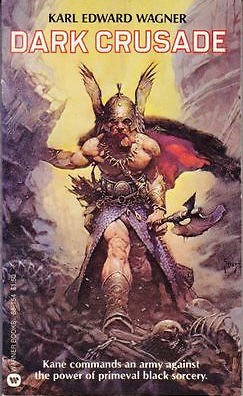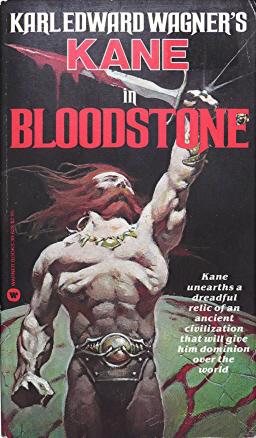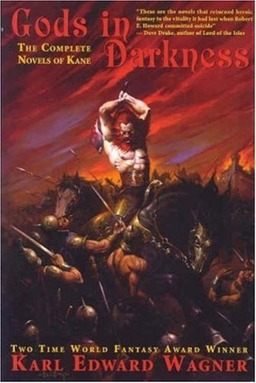Bloody Battles, Espionage, Dark and Beautiful Prose, & Lovecraftian Horror: A Review of Karl Edward Wagner’s Dark Crusade
 You guys are going to love for me for this. So very much. Someone, somewhere might have mentioned this already, but whatever, now it’s my turn.
You guys are going to love for me for this. So very much. Someone, somewhere might have mentioned this already, but whatever, now it’s my turn.
All of the Kane books, both the novels and short story collections, have been released on Kindle for four or five bucks each, which is a mere three pounds if you live in England. It’s kind of bittersweet actually, because it means all that time I spent rummaging around in the musty corners of used bookshops looking for Bloodstone (which I reviewed, by the way) has kind of gone to waste, and anyone that spent around 100 bucks for a copy of Gods in Darkness or Midnight Sun is going to want to curl up in a big ball over there in the corner and have a little cry. So whilst you do that, I’m going to get on with the review, if you don’t mind.
Dark Crusade revolves around the rise of the dark Cult of Sataki, its meteoritic domination of the kingdom of Shapeki, the brutal regime it establishes and its enigmatic and mysterious prophet Orted something or other. When Orted’s fanatical cult of peasants try to seize the southern kingdoms, they are swiftly and brutally quelled by a superior military force, and that’s when Kane, a mercenary, steps in to help.
Kane really is the star of the show here, as anyone familiar with the series will tell you, but for anyone not in the know, Kane is a prince cursed with immortality who has wandered the world for eternity, plumbing its secrets, learning grim and interdicted sorceries, seeking out mysteries and conflicts and battle and war, and just generally trying to entertain himself during the course of his unending life.
His long years have given him knowledge and skill beyond that of any normal man, but also a sense of detachment; the man has no true friends, no real allies and any he attains are mere tools, to be used to meet his own mercantile means. He’s fascinating, fantastic, utterly self-interested, somehow channeling Moorcock’s Elric and Howard’s Conan at the same time; two opposite sides of the same coin. He’s hands down one of the best anti-heroes in the business.
 But you all already knew that, didn’t you? Yeah, you did. What you really want to know is if this novel, in particular, is any good. Well, fear not, reader, that part, the actually good bit of this review, is forthcoming.
But you all already knew that, didn’t you? Yeah, you did. What you really want to know is if this novel, in particular, is any good. Well, fear not, reader, that part, the actually good bit of this review, is forthcoming.
It doesn’t start off too well; where Bloodstone clapped you on the back and strapped you into a rollercoaster straight into a volcano made of solidified awesome right from the start, Dark Crusade starts by putting you in a rocking chair and feeding you breast milk next to a warm open fire. It spends too long twatting about in the history and politics of the setting, talking about how the king is dying and two rival sides, the red and the blue, have cropped up, each vying for power, and how civil war has erupted between them; oh wait no it’s not full on civil war, it’s just semi-civil war with the occasional massacre thrown in for good measure; it’s convoluted and irritating and serves no purpose other than to establish a rivalry between Kane and another general, Jarvo, and to show us that Kane is really cunning, all of which could have been done better with a different situation anyway.
And, Kane aside, it leaves us with a bunch of odious caricatures that don’t evolve much until very late in the narrative. In the Kane series, the setting has never been more than a quasi-medieval world with something of a gothic twang, something that changed whenever the narrative needed it to. And that’s the case here, it’s just that Wagner lingers on the backstory a little too long.
Then there’s the issue of Orted’s grand unveiling at a big ol’ trade fair by the cult of sataki. The cult tells everyone that the world’s about to end and that everyone’s going to die and that their dark god is about to fart fiery destruction all over creation, that the only hope of salvation is to join their dark cult and instead of doing the normal thing, you know, telling Orted he’s a delusional thicko, the peasants conceive that, somehow, he must be right and proceed to freak out, kill all the guards, and put the cult in control.
What? Whether Orted was possessed by a dark demon god or not, the people have no convincing reason to believe that this obscure, decadent local cult holds the key to life or death in the apocalypse, simply because the prophet doesn‘t have a shadow, which is, apparently a common trick, anyway.

It all feels like a plot device, something Wagner used to get the ball rolling rather than thinking about how actual people act. Here they act like automatons, puppets that bend to the whim of their master, no matter how stupid his proposals are. Real people might tell Orted to go away and think about his life but, evidently, Wagner spent the entirety of his life in a cupboard making his puppets dance for him and cackling maniacally. He is, admittedly, one crazy looking dude.
So the opening is less bitchin’ bare-fisted fantasy bar fights with creatures from beyond the cosmic veil of time and space, and a little more political twaddle and stupid people being stupid.
But, that isn’t to say the narrative doesn’t eventually become compelling. It’s impossible to deny the sheer volume of stuff that Wagner shoves in here; within the space of two-hundred something pages we have moral ambiguity, betrayals, power mad prophets, brutal and bloody battles, espionage, dark and beautiful prose, sword fights, desperate escapes, Lovecraftian Horror, and a psychedelic romp through Kane’s very own mind. In that space, all the Grim Company did was play cards and try to eat their own farts.
Admittedly, nothing quite matches the stonking great green death ray from Bloodstone, but one gets the sense that Wagner wasn’t trying to do that, that he was aiming for something of a slightly different flavor than Bloodstone’s pulpy action. The characters are more developed, are given noticeable flaws, and when you aren’t with Kane there isn’t always the sense that something more interesting is happening somewhere else, like there was with Bloodstone. Jarvo, in particular, gets quite a lot of development, going from a smarmy, self-satisfied idiot at the start of the novel to a broken, honorable man not only trying to bring down the Satakis, but trying to do it whilst caring for those who helped him during his hour of need, someone prone to bouts of blindness, of impetuous stupidity that ultimately prove very dangerous. He’s almost as interesting as Kane, so you pine for the big red teddy bear a little less when he’s not around.
Oh, and this is a brutal book, too, brutal in a way that compliments the narrative, as opposed to being brutal for the sake of being brutal, like Joe Abercrombie can occasionally be. Having established dominance over most of the southern continent, the Sataki cult consolidates their power by eradicating any and all who don’t subscribe to their particular strain of thought; public executions, indoctrination, and midnight raids are all commonplace. Children sport with decapitated heads and crucify their peers on the street, all as the city guards look on, nonchalant.
Sure, it establishes the Satakis as utterly ruthless, but it creates this world in which there is no hope, in which there are no heroes, the closest thing to a ‘good guy’ there is Jarvo, who although he has a strong cause, can be reckless and selfish. Kane is a self-interested mercenary, only really involved to kill a few more hours; there’s no hope for these people, and any prospects are dashed away as soon as they emerge. It’s bleak, but without being in your face about it.
 Oh yeah, and the prose, I have to mention the prose. It’s perfect. It strikes the ideal balance between simple readability and beautiful description; it remains powerful and poignant without ever being pretentious or indigestible. It’s rich, wonderful, fantastic, filled with those lines that make you feel all warm and giddy inside, in a chilling way, if that makes sense. It’s like a Frank Frazetta painting given life, just… less sexist. No I don’t know how you could take the sexism out of Frazetta. Shut up.
Oh yeah, and the prose, I have to mention the prose. It’s perfect. It strikes the ideal balance between simple readability and beautiful description; it remains powerful and poignant without ever being pretentious or indigestible. It’s rich, wonderful, fantastic, filled with those lines that make you feel all warm and giddy inside, in a chilling way, if that makes sense. It’s like a Frank Frazetta painting given life, just… less sexist. No I don’t know how you could take the sexism out of Frazetta. Shut up.
In the end, whatever criticism I can throw at Dark Crusade is negated, instantly, by its finale. Kane wrestles a polar bear. A polar bear. The only thing that could make it more awesome is if Brian Blessed wrenched the book from your hands and started reading it aloud in the most dramatic voice he can muster.
In all seriousness, though, the finale is certainly a highlight; it’s at once imaginative, atmospheric, brooding, and grim, seamlessly blending looming existential horror with the riveting action the genre’s famous for, and somehow, it makes it work. At some points, it skews even the reader’s perceptions, making them question reality, making them doubt the scenarios they’re presented with. It explores Kane’s psyche and hints at his past.
It was written with an obvious degree of passion. One moment, you’ll find yourself cheering as Kane downs a giant slug monster, and the next you’ll cower under your bed sheets, a pool of urine slowly forming beneath you. It’s fantastic, the perfect blend of action and horror and one of the things I’ll point to when asked why I love sword and sorcery as much as I do.
[Spoilers ahead.]
If there’s anything I can complain about here, it’s how it feels stapled on to the end of the novel, how Wagner felt stuff had to get meta at some point. It feels like a Deus Ex Machina. A really, really cool Deus ex Machina, but a Deus Ex Machina nonetheless. The scenario itself is actually a battle with a huge celestial demon god thing. If Kane wins, he can supposedly open the way to any number of infinite universes, none of which are explored or given any development whatsoever. Kane’s just dumped somewhere else in the world and that’s it, no rocket ship volcanoes, or planet filled with giant talking flamethrowers made of sharks. Nope, nothing like that.
[End Spoilers.]
I know I’ve lobbed a lot of criticisms at Dark Crusade, but it’s honestly the most fun I’ve had in a while, and it’s certainly a novel I’ll remember for some time to come. Those criticisms are, ultimately, just minuscule flaws on the face of a stonking great diamond.
Pick up your Kindle, go to the Amazon store, and buy this book so hard the Internet explodes. Now.
Funny you should mention ‘Bloodstone’ as I started reading it yesterday. I was visiting my parents and noticed a black hardback up on one bookshelf. It didn’t have a cover, but my eagle eye had spotted Karl Edward Wagner’s name on the spine. I took it down, more out of curiosity than anything else. I was pretty sure I’d read all the Kane stories, but a quick glance at the list of contents proved me wrong. ‘Bloodstone’? How had I ever missed that? I mentioned the book to one of my brothers afterwards and it turns out I gave it to him years ago as a birthday present.
Great review! And one minor quibble — although I’m very happy to see the Kane books up on Kindle, I don’t believe they have _everything_ — they’re basically reprints of the original 3 novels & 2 short story collections, plus The Book of Kane, but they don’t have the modern-day stories or the novel fragment.
(Unless they do, in which case I’d be very, very, very happy to be proven wrong.)
Having said that, having 95% of Kane on my Kindle is still infinitely superior to having none.
It’s been many a year, but didn’t Orted brush off an arrow to the heart, and then the unwashed market masses freaked out and joined him? I love that scene just for the local commander’s attitude at the end of it.
But then Bloodstone is my least favorite of the Kane novels, so what do I know. 🙂
Good news about the ebooks, especially for those of us who sold Midnight Sun for $100. (Odds are good whoever I sold it to is happy with the purchase, ebooks or no ebooks.)
That cover art…I know it’s become stock, but for me, it will always summon up memories of Molly Hatchet.
It’s on Google books, too, just FYI.
Only downside is neither has the classic covers. However, they were Frazetta covers (Stories totally worth it!) but with Fraz dead (RIP!) and his estate in question they likely would be bid way too much $ to make it worthwhile. They do, on kindle and google books change covers. Originally all the “Gor” books had no covers, but later they commissioned some new covers for them and updated them.
That’d be a good article here, from an industry insider – newer and digital editions tend not to have the classic covers we remember. Being master of the obvious, but that seems to argue that a commission for a book cover only ‘covers’ that exact printing. This will create a problem later, as Frazetta while always the #1 master of fantasy/sci fi art, now he’s dead and his estate is getting the most out of it so they might ask again much more than Frazetta did at the first go-round. That would also explain not having the very cool Kelly Freas cover for “Marauders of Gor”.
IMO the best solution would be to have Google Books let people modify the covers on their own books -technically, I have Marauders of Gor, so I want that Freas cover, also the Boris cover for Assassin of Gor which my cat peed on, so legal backup rules apply- then Kindle would grudgingly comply also once Google put that feature in.
For me, since I have a plain ol’ Kindle Keyboard (and am contemplating adding a Paperwhite to the mix), the cover art is less of a concern these days.
Well, that’s not entirely true — once it’s on my Kindle, it doesn’t matter, but it would probably help when I’m browsing on the store.
Connor said: “. . . anyone that spent around 100 bucks for a copy of Gods in Darkness or Midnight Sun is going to want to crawl up in a big ball over there in the corner and have a little cry.”
Au contraire! Some of us actually prefer hunting down and getting the old stuff. Furthermore, some of us old stodgy types still don’t like reading on electronic devices if we can help it.
@markrigney: Molly Hatchet! You are so right!
They are probably not crying too much since ‘Midnight Sun’ actually has the additional stories :-)I have recently read all of the Kane stories barring the few additional tales in Midnight Sun (which I didn’t have access to. I enjoyed Dark Crusade more than Bloodstone, and the shorter work beats out all the novels. Hopefully the e-book releases will bring a new and deserved readership
@James McGlothlin: You’ve encapsulated my position neatly.
Great review. Makes me want to reread this one sooner rather than later.
My first exposure to Kane and Wagner was “Reflections for the Winter of My Soul” which is set right after Dark Crusade. This is the best sort of dark S&S.
I was lucky — when I first became aware of Kane, it was still possible to find paperbacks just in the used book section at Uncle Hugo’s.
My _first_ Kane, though, was ordering the Donald M. Grant Book of Kane. Back when the way you ordered a book was you wrote a check, put it in an envelope with an order form, stamped it, mailed it, and hoped for the best.
Hi everyone!
I would have responded sooner, but I’m holiday at the moment and my internet access is a little limited, so my responses will be brief because I can’t type withh a touchscreen and I’m trying not to hog everyone’s internet.
Hi aonghus fallon, you seem to be lucky then, in that your family likes fantasy; mine don’t care, so a lot of the stuff I found and read as a kid had to be done so largely independantly, I foind bloodstone buried under a tonne of books at a used bookstore in town and immediately shattered the silence of the place by shouting ‘yes!!!’ As loud as possible, much to the anger of the elderly owner. I’m a rebel.
Hi Joe
Glad you enjoyed the review: I honestly couldn’t tell you if the kindle versions had all the extra stories and whatnot, I saw the books were on sale for kindle and thought it’d be awfully nice if everyone knew about it, so I’ll admit to not being too sure on that front 🙂
Hi Jeff
You may be right, but what I remember was they freaked out when they saw orted didn’t have a shadow, in the grand scheme of things though that part was only really a nitpick 😀
And, mark rigney, I’d never actually heard of molly hatchet before now, but I’ll have to listen to them when I get a faster connection, although I feel some of motorheads more apocalyptic songs have a touch of wagner to them, and clark ashton smith actually.
Hi green gestalt.
I’m with joe here in that cover art doesn’t mean that much to me, I can appreciate frazetta cover as mucb as anyonr but its never been make or break for me. Still though, that article sounds like a good idea, something msybe scott tayler could maybe tackle and you seemed to say it pretty well 🙂
Hi james
Aaaah I’m part of the new age, see? 😉 I quite like kindles and the like myself, it means I don’t have to import everything from the US and its portable and stuff, but I can see what you mean. But we all know you’re sobbing on the inside, james 😉
Hi sdfe patch
That I didn’t know, but for a $90 saving I’ll make the sacrifice, as for the short stories they truly are brilliant; fletcher vrendenburgh wrote a great piece on those and said everything there is to say, I’d include a link if my tabket weren’t terrible at that sort of thing, but I think my bloodstone article, which is linked to at the start, contains a link 😀
Hi fletcher.
Wasn’t reflections the story in which kane investigates a series fo crimes comitted by a werewolf? That was great, but my personal favourite
is cold light were an extremist mercenary band hunts Kane through the dead city demornte
Oh, and please forgive any typos, I’m typing on a tabket and jts almost midnight and I’m. Ery, very tired 🙂
[…] Bloody Battles, Espionage, Dark and Beautiful Prose, & Lovecraftian Horror: A Review of Karl Edw… […]
The rise of the Cult of Sataki isn’t any more stupid than many actual historical occurrences.
Eg., the Children’s Crusade.
People flinging themselves over cliffs at the behest of some charismatic lunatic or conman is common as dirt.
I think characterization works best depending on the character.
Edgar Rice Burroughs is my favorite author and gives us the twin poles of characterization and lack thereof in his two principle series.
In the Mars series, John Carter is unaccountably immortal. We know little about his background except that he’s always been somehow involved in fighting and has received plaudits for his service on five continents. He himself is unaware of much of his past, but that doesn’t matter because his focus is on his present. He is an I wresting character precisely because he isn’t fleshed out. Revealing all the events that caused Carter to become the man he is in the stories would diminish him as a character and ruin the enigma associated with him.
On the other hand, Tarzan is strong precisely because Burroughs makes a significant deal of his characterization–even including Tarzan’s parents in the beginning of the story while never even referencing Carter’s family besides Burroughs himself. Tarzan is a strong character precisely because we see his origin.
We thus see two different approaches from the same author to providing us with a main character, both equally successful despite being polar opposites in conception and execution.
I would therefore argue it is not the depth of the character that matters but how he and his world come to life in the reader’s mind that makes a character interesting and engenders mass appeal among the reading audience.
On the topic of Kane, Wagner does flesh him out across the course of the novels and stories. We learn about him in his various adventures, but Wagner is wise to break this down into easily digestible chunks. We don’t have a glut of characterization interfering with the pacing of the narrative as in the case of the 2012 John Carter movie. Rather, Wagner fills in some lacunae as things progress so as to have Kane become more identifiable to the audience while being silent on other things so as to preserve some of the mystery of the character and keep readers from viewing him as a generic David Eddings-style hero.